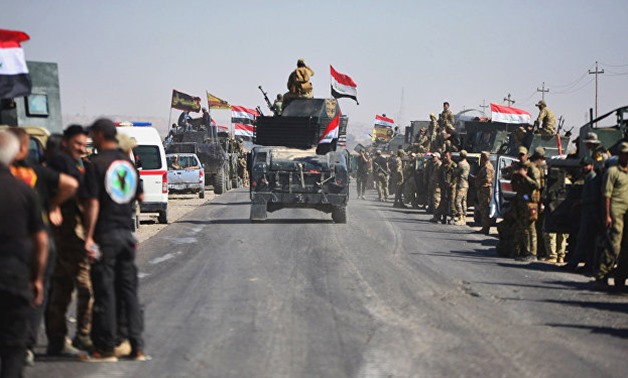
Members of Iraqi federal forces gather to continue to advance in military vehicles in Kirkuk. REUTERS
Cairo - 18 October 2017: The recent conflict in Kirkuk and other disputed areas on the controversial border between Iraqi Kurdistan and Iraq has led to the beginnings of a refugee crisis – a crisis which we do not know the limits of yet.
The previous few days have seen the Iraqi Security Forces (ISF) and Iran-backed PMF militants take control of key disputed territories between the Kurds and Iraqis, as well as important strategic locations, such as Kirkuk Airport and the K1 military base.
As the forces from the south rolled into Kirkuk and its surrounding areas, many thousands of people fled the expected bloodshed as troops lined up on either side expecting a fierce fight. As the ISF and PMF pushed forward, it became apparent that some PUK elements of the Peshmerga had agreed to abandon their posts, and the Peshmerga resistance collapsed almost instantly with little direct combat.
Many people returned to Kirkuk following this quick campaign, as they feared the destruction and theft of their property, as was seen in Tuz Khurmatu. However, today has seen this situation reverse once more. Reports circulated that a second major operation would be conducted by the Iraqi Security Forces and its allied PMF forces, and allegedly people were advised to leave the city.
Regardless, high levels of violence, theft and sectarian actions have led to major population movements as Kirkuk’s residents fled the city. Photos of Iran’s Supreme Leader Ali Khamenei hang in government buildings, while militiamen roam the streets looting houses and robbing civilians. A source close to Egypt Today spoke of how militiamen robbed civilians under the premise of conducting investigations to disarm residents.
He now lives in “terror and agony” with nowhere to turn.
This is the story of those who are unable to flee Kirkuk and other disputed areas to Erbil and other places of safety. Those without family in the heart of Iraqi Kurdistan are stuck between a rock and a hard place, as they weigh the choice between remaining where they are or taking their chances on the road.
At the border crossing in Altun Kompri, the final border crossing between Erbil and Kirkuk, the pressures of internal displacement can be felt. Thousands of people fleeing the conflict in Kirkuk, Tuz Khurmatu, Taza Khurmatu and other areas are making their way to the supposed relative safety of Erbil, Sherwan Wasman told Egypt Today.

Within 10 days after the bridge crossing over the Peshkhabour River was reopened on August 15, nearly 50,000 refugees, mostly Syrian Kurds, had flooded into Iraqi Kurdistan. AFP
Those with a place to go are able to pass though the border, after complying with the necessary security measures, with relative ease. It is those seeking refuge who face the hardest struggle.
Iraqi Kurdistan shelters around 2 million refugees from the war against the Islamic State in Iraq and the conflict in Syria, and a high number of displaced peoples from the recent Battle of Mosul and Hawija have pushed resources to the limit.
“The camps are located southwest of Erbil and also east of Erbil, but the problem is that there are few plots available, as still there’s people in the camps who fled from Mosul.” These were the words of Sherwan Wasman, who is currently at the border crossing and working alongside U.N. agencies to help provide a rapid response and necessary items to displaced people from the disputed areas.
“It’s getting bad,” he continued. “The capacity to absorb is limited, and the camps are already occupied by IDPs and refugees.”
Iraqi Kurdistan was one of the first actors in the war against the Islamic State and one of the first to support the refugees who spilt out of conflict zones in Iraq and neighboring Syria. Now they are on the brink of suffering a refugee crisis of their own, as they struggle to meet the demands being asked of them.
As long as the material support is provided, the Iraqi Kurds have always proven capable. But this necessary support must be provided to reduce the weight on the shoulders of the people who have been fundamental to reducing instability in Iraq and supporting those in desperation from Syria but are now finding themselves isolated from every corner.
Twitter:


Comments
Leave a Comment